
What are Sovereign Wealth Funds and their Purpose?
Sovereign Wealth Funds (SWFs) are state-owned investment funds or entities. They manage a country’s reserves to achieve financial objectives. SWFs typically invest in a variety of assets, including stocks, bonds, real estate, and infrastructure. Their primary purpose is to stabilize the economy, save for future generations, and generate wealth. For example, the Norwegian Government Pension Fund Global is one of the largest SWFs, designed to invest surplus revenues from the petroleum sector. SWFs can also support national development goals and enhance economic stability during downturns. They play a crucial role in global financial markets by providing liquidity and long-term capital.
How do Sovereign Wealth Funds operate within local economies?
Sovereign Wealth Funds (SWFs) operate within local economies by investing in various sectors to stimulate economic growth. They allocate capital to infrastructure projects, which can improve public services and create jobs. For example, investments in transportation or healthcare infrastructure can enhance accessibility and quality of life for residents. SWFs also invest in local businesses, fostering entrepreneurship and innovation. This investment can lead to job creation and increased economic activity. Additionally, SWFs often support community development initiatives, such as education and housing projects. These initiatives can enhance social welfare and economic stability. By providing a stable source of funding, SWFs can help mitigate economic downturns and promote long-term growth.
What sources of revenue do Sovereign Wealth Funds utilize?
Sovereign Wealth Funds (SWFs) primarily utilize revenues from national resource exports, particularly oil and gas. These funds often invest surplus revenues generated from commodities into various asset classes. Additionally, they may receive income from taxation, government budget surpluses, and foreign currency reserves. Many SWFs also engage in global investments, generating returns through equities, bonds, and real estate. For instance, the Government Pension Fund of Norway receives revenue from the country’s oil sector, which is then invested globally. This model allows SWFs to support domestic economies while diversifying their investment portfolios.
How do investment strategies of Sovereign Wealth Funds vary?
Investment strategies of Sovereign Wealth Funds (SWFs) vary based on their objectives, risk tolerance, and geographical focus. Different SWFs prioritize different asset classes, such as equities, bonds, real estate, or alternative investments. For example, Norway’s Government Pension Fund Global primarily invests in equities and fixed income, aiming for long-term returns. In contrast, the Abu Dhabi Investment Authority diversifies across various asset classes, including private equity and infrastructure.
SWFs also differ in their investment horizons. Some, like the Kuwait Investment Authority, have a long-term focus, while others may engage in shorter-term strategies. Regional economic conditions influence these strategies as well. For instance, SWFs from resource-rich countries may invest heavily in commodities, while those from developed nations might focus on technology and innovation sectors.
Additionally, the governance structures of SWFs can impact their investment strategies. Funds with independent investment committees tend to have more flexibility in decision-making. Overall, the variation in investment strategies reflects the unique mandates and goals of each Sovereign Wealth Fund.
Why are Sovereign Wealth Funds significant for job creation?
Sovereign Wealth Funds (SWFs) are significant for job creation because they invest in various sectors that stimulate economic growth. These funds often target infrastructure projects, which require substantial labor and resources. For instance, investments in transportation or energy infrastructure create direct and indirect job opportunities. According to the International Monetary Fund, every $1 billion invested in infrastructure can generate approximately 13,000 jobs. Additionally, SWFs can support local businesses by providing capital for expansion, leading to further employment opportunities. Their investments in technology and innovation can also foster new industries, contributing to long-term job creation. Therefore, SWFs play a crucial role in enhancing employment through diverse investment strategies.
What types of jobs are typically created by Sovereign Wealth Fund investments?
Sovereign Wealth Fund investments typically create jobs in various sectors. These include infrastructure development, healthcare, education, and technology. Infrastructure projects generate construction jobs, ranging from laborers to engineers. Investments in healthcare can create roles for medical professionals and administrative staff. Educational funding often leads to positions for teachers and support staff. Technology investments usually result in jobs for software developers and IT specialists. For instance, the Abu Dhabi Investment Authority has funded numerous infrastructure projects, leading to thousands of construction jobs. Such investments stimulate local economies by increasing employment opportunities across multiple industries.
How do these jobs impact local communities and economies?
Jobs created by sovereign wealth funds significantly boost local communities and economies. They provide employment opportunities, reducing unemployment rates. Increased job availability leads to higher disposable incomes for residents. This, in turn, stimulates local businesses through increased consumer spending. Additionally, jobs often come with benefits, improving overall community well-being. Infrastructure investments funded by these jobs enhance local services and facilities. Improved infrastructure attracts further investments, creating a positive economic cycle. Studies show that regions benefiting from sovereign wealth fund investments experience substantial economic growth.

How do Sovereign Wealth Funds contribute to Infrastructure Investment?
Sovereign Wealth Funds (SWFs) contribute to infrastructure investment by providing substantial capital for large-scale projects. They invest in various sectors, including transportation, energy, and utilities. SWFs often target long-term returns, aligning with the lengthy timelines of infrastructure projects. This investment helps bridge funding gaps in public infrastructure. For instance, according to the International Monetary Fund, SWFs manage over $10 trillion in assets globally. Their investments can enhance economic growth by improving public services and creating jobs. Additionally, SWFs often partner with private investors to leverage expertise and share risks. This collaboration can lead to more efficient project execution and better outcomes for local economies.
What infrastructure projects are commonly funded by Sovereign Wealth Funds?
Sovereign Wealth Funds commonly fund large-scale infrastructure projects. These projects include transportation systems, such as roads, bridges, and railways. They also invest in energy infrastructure, including renewable energy facilities and power plants. Additionally, they finance social infrastructure, which encompasses schools, hospitals, and public housing. Water supply and sanitation projects are another area of investment. Furthermore, they support telecommunications infrastructure to enhance connectivity. These investments are often aimed at stimulating economic growth and job creation in local economies.
How does infrastructure investment foster economic growth?
Infrastructure investment fosters economic growth by improving connectivity and efficiency. Enhanced transportation networks reduce travel time and costs for businesses. Improved utilities, such as water and electricity, increase productivity. Investments in digital infrastructure support technological advancements and innovation. According to the World Bank, every dollar spent on infrastructure can generate up to $3 in economic returns. Additionally, infrastructure projects create jobs during construction and in ongoing operations. These jobs not only provide income but also stimulate local economies. Overall, infrastructure investment is crucial for sustainable economic development.
What are the long-term benefits of infrastructure funded by Sovereign Wealth Funds?
Infrastructure funded by Sovereign Wealth Funds provides long-term economic stability and growth. These funds contribute to the development of critical infrastructure, such as roads, bridges, and public transportation systems. Improved infrastructure enhances connectivity, reducing travel time and costs for businesses and consumers. This leads to increased economic activity and productivity.
Additionally, infrastructure projects create jobs during both construction and ongoing maintenance phases. According to the International Monetary Fund, every dollar invested in infrastructure can generate up to $3 in economic returns. Enhanced infrastructure also attracts foreign investment, boosting local economies.
Furthermore, such investments can improve public services, including healthcare and education, contributing to overall community development. As a result, regions benefit from sustained economic growth and improved quality of life for residents.
How do Sovereign Wealth Funds influence community development?
Sovereign Wealth Funds (SWFs) influence community development through strategic investments in local infrastructure and social projects. These funds allocate capital to essential areas like education, healthcare, and transportation. For example, the Abu Dhabi Investment Authority has invested in renewable energy projects, enhancing local job opportunities. SWFs often partner with governments to identify community needs. This collaboration can result in improved public services and facilities. Additionally, investments by SWFs can stimulate economic growth, leading to increased tax revenues for local governments. This growth can further fund community development initiatives. Overall, SWFs play a vital role in shaping sustainable local economies.
What community development initiatives are supported by Sovereign Wealth Funds?
Sovereign Wealth Funds (SWFs) support various community development initiatives. These initiatives often focus on infrastructure, education, healthcare, and sustainable development. For instance, SWFs invest in building roads, schools, and hospitals in local communities. They also fund programs aimed at improving public health and education access. Additionally, SWFs may support renewable energy projects that promote sustainability. Investments in affordable housing projects are also common. These initiatives help stimulate local economies and create jobs. According to the International Forum of Sovereign Wealth Funds, these investments enhance the overall quality of life in communities.
How do these initiatives improve quality of life in local areas?
Sovereign wealth fund initiatives improve quality of life in local areas by creating jobs and enhancing infrastructure. Job creation leads to increased employment opportunities for residents. This, in turn, boosts local economies through increased spending power. Infrastructure investments improve transportation, healthcare, and education facilities. Enhanced infrastructure supports business growth and attracts new investments. Research shows that regions with strong infrastructure see a 20% increase in economic productivity. Community development initiatives foster social cohesion and improve public services. Together, these factors contribute to a higher standard of living for local populations.

What challenges do Sovereign Wealth Funds face in local economies?
Sovereign Wealth Funds (SWFs) face several challenges in local economies. These challenges include political risk, regulatory barriers, and public perception. Political risk arises from changes in government policies that may affect investments. Regulatory barriers can hinder SWFs from efficiently deploying capital in local markets. Public perception issues may stem from concerns about foreign ownership and influence. Additionally, SWFs often encounter difficulties in identifying suitable investment opportunities that align with local economic needs. These challenges can limit the potential positive impact of SWFs on job creation and infrastructure development in local economies.
How do political and economic factors affect Sovereign Wealth Fund operations?
Political and economic factors significantly influence Sovereign Wealth Fund (SWF) operations. Political stability affects investment strategies and risk assessments. Countries with stable governments attract more foreign investment. Economic conditions, such as GDP growth, dictate available capital for investment. High economic growth typically leads to increased fund inflows. Conversely, economic downturns may force funds to liquidate assets. Regulatory frameworks also shape operational guidelines for SWFs. For instance, transparency and governance standards impact investor confidence. Additionally, geopolitical tensions can restrict investment opportunities in certain regions. These factors collectively determine the performance and strategic direction of SWFs.
What are the risks associated with Sovereign Wealth Fund investments?
Sovereign Wealth Fund investments carry several risks. These include market volatility, which can significantly affect returns. Political risk is another factor, as changes in government policies can impact investments. Currency fluctuations can also pose a risk, especially in foreign investments. Additionally, liquidity risk may arise if funds cannot be easily converted to cash when needed. There is also the risk of poor management decisions, which can lead to suboptimal investment outcomes. Lastly, reputational risk exists, particularly if investments are perceived as unethical or controversial. Each of these risks can undermine the financial stability and objectives of Sovereign Wealth Funds.
What best practices can enhance the positive impact of Sovereign Wealth Funds?
Implementing transparency and accountability measures can enhance the positive impact of Sovereign Wealth Funds. These practices build public trust and ensure responsible management of funds. Regular reporting on investment performance and social outcomes is essential. Engaging stakeholders in decision-making processes fosters community support. Diversifying investment portfolios can reduce risks and improve returns. Investing in sustainable projects aligns with long-term economic growth. Collaborating with local governments enhances infrastructure development and job creation. Studies show that transparent funds tend to perform better and positively influence local economies.
How can transparency and accountability improve Sovereign Wealth Fund effectiveness?
Transparency and accountability can significantly improve Sovereign Wealth Fund (SWF) effectiveness by enhancing trust and stakeholder engagement. When SWFs operate transparently, they provide clear information about their investment strategies and performance. This openness allows stakeholders to understand how funds are managed and allocated. Accountability ensures that fund managers are held responsible for their decisions and outcomes. Studies show that SWFs with strong governance frameworks outperform their peers. For example, the Santiago Principles promote transparency and accountability, leading to better investment practices. Enhanced transparency can also attract more investors, increasing capital inflow. Ultimately, these factors contribute to more effective fund management and positive local economic impacts.
What role do partnerships play in maximizing benefits from Sovereign Wealth Funds?
Partnerships enhance the effectiveness of Sovereign Wealth Funds (SWFs) in achieving economic benefits. They facilitate access to local market knowledge and expertise. Collaborating with local businesses can lead to more targeted investments. This approach often results in job creation and infrastructure development. For example, partnerships with private entities can streamline project execution. They also allow for risk-sharing, making investments more attractive. Additionally, partnerships can foster community engagement and support. This engagement is crucial for aligning investments with local needs. Ultimately, effective partnerships can maximize the overall impact of SWFs on local economies.
Sovereign Wealth Funds (SWFs) are state-owned investment entities that manage national reserves to achieve financial objectives, primarily focusing on job creation, infrastructure investment, and community development. This article examines the operations of SWFs within local economies, highlighting how their investments stimulate economic growth by funding infrastructure projects and supporting local businesses. It also discusses the sources of revenue for SWFs, their varying investment strategies, and the significant impact they have on job creation and community welfare. Furthermore, the article addresses the challenges SWFs face and best practices to enhance their effectiveness in promoting sustainable economic development.
